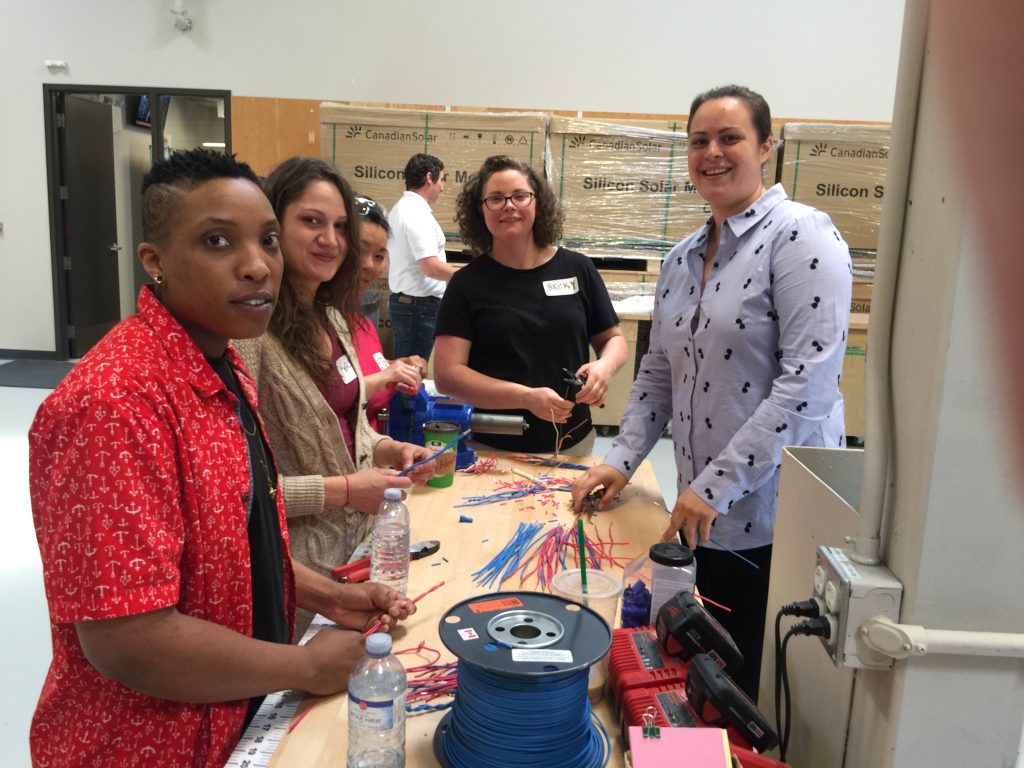An open house hopes to spark women’s interest in the electrical trades. The Electrical Joint Training Committee (EJTC) held its fifth annual open house in Port Coquitlam, B.C. on May 27.
EJTC chief instructor Kelly Kienleitner said the open house was intended from its inception to bring more women into the industry.
“I was at a conference in Ottawa and my training director at the time stood up and said he wanted more women in the trades,” she said. “We started with our very first open house and it was because I’ve learned that women won’t choose the trades unless they see someone who looks like them. This event is an opportunity for women to come into the building and try the trade.”
Participants at the open house were able to do simple splicing, bending a pipe and wiring a simple light and switch in order to demonstrate “this is something they can do,” she said.
“We’ve had at minimum one woman enter the trade every time we do this open house, and I think we’re going to get five or six out of this one,” Kienleitner added.
Cassidy Burke, an apprentice currently working with Burnaby-based Sasco Contractors, went through the EJTC program and said the open house was the reason she is now in the industry.
“I found out about the trade from a friend. When I first started out I had assumed electrical was going to someone’s house and wiring up a light bulb, but he told me about all the interesting things he was doing, which really interested me and that’s what got me to go to an open house like this one,” Burke said.
As a woman, her experience in the trades has been generally positive.
“In my class of 16 there were four of us, and the instructor was also a woman, so we could all support each other. On the job, I don’t think I’ve run into any problems per se being a woman,” she said.
Kienleitner, who has been in the industry since the late 1990s, said her formative experiences were different to those experienced by women currently entering the trades.
“I was the first woman in my first trade. I used to build all the high voltage equipment that electricians installed like motors, generators, transformers and switch gear. It was tough,” she said.
“I put up with a lot of nonsense in my first trade, and luckily I’m ex-military, so I was tough enough skinned, managed to get through it and ended up as top apprentice in my class,” she said.
“When men on the floor figured out I was there to do my job, they took me under their wing and trained me. Especially the older journeymen, they loved having me on the crew because I loved my trade and wanted to learn it.”
Kienleitner will soon be the first female apprenticeship director in IBEW 213’s history, and said today’s construction industry is radically different from when she got her start.
“It has changed so much. When I started, we didn’t have safety gear that was small enough for us, and when they brought in safety gear that fit us, some of the guys were appreciative because they couldn’t wear big safety gear either.”
Other changes, she said, include the shift in tone once women are introduced into a work crew.
“It becomes more collaborative. The whole female, male thing…I always say there’s two genders in my trade, apprentice and journey. Other than that, who cares?” Kienleitner said.
Becky Lupton is a journeyperson and electrician who has been in the trade for seven years and currently works for Seaspan. Lupton ran demonstrations at the open house and said she had experienced a mix of situations as a woman in the trades.
“Some of it has been awesome. I’ve run into gentlemen who are really interested in furthering what it means to be an electrician and showing me the proper way to do things, and I’ve run into people who are not so enthusiastic, and see you more as a tool for the company to get some cheap labour and make some money on a build that perhaps they aren’t doing so well on financially,” she said.
“The good news is that’s getting fewer and farther between but I do hear from people who feel being a woman in the trades is holding them back from being shown experience or education, and prevented some people from opportunities they feel they could have had.”
But with a wave of retirements throughout the industry, Lupton said worker demand may turn the tide.
“The more women you see in my position now, doing reasonably well, having made it through the journeyman process, which is the difficult part…you’re going to feel more hope that you can reach that point.”











Recent Comments